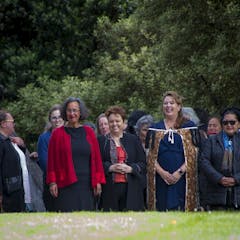
Articles on te reo Māori
Displaying all articles

The indigenous languages of Taiwan are struggling in the face of Chinese dominance. The answer to language revitalisation could lie in grassroots efforts rather than government legislation.

The last native Moriori speaker died over a century ago. Can an ambitious new project bring the language back from the brink?

Concern over bilingual road signs in New Zealand is as much political as it is about safety – but the international evidence suggests there’s little to worry about.

More Indigenous sports stars are speaking their mother tongues in TV interviews and elsewhere. The challenge now is to develop truly bilingual commentary teams to keep the ball alive.

We encourage everyone to learn te reo Māori, but if not done well and ethically, it could be another wave of colonisation.

Accusations of being a ‘useless Māori’ or seeing life through a ‘vanilla lens’ might sound mean-spirited and hurtful. But behind the political sloganeering lie deeper questions about Māori identity.

Te Wiki o Te Reo Māori is a time to celebrate Aotearoa’s Indigenous language. But we also need to acknowledge the limits of literal translation and pay attention to the deeper meanings of words.

Ki te tini o ngā umanga Māori, he whānui kē atu ngā hua ka whāia tēnā i ngā putanga ahumoni anake. He rautaki reanga-maha ō rātou, he whakanoho rātou i te painga mō te katoa hei ahunga mō te ihu o te waka. He akoranga i konei mō ētahi atu umanga.

Māori businesses often prioritise more than financial results, have multi-generational strategies and put community at the centre of planning. Other businesses could learn from this.

A veterinary scientist by training, Massey University Vice-Chancellor Jan Thomas has turned to the humanities to learn more about Māori. Here she explains why.

The state-sponsored pop cultural renaissance of Korea shows how language isn’t an obstacle to world domination.

Ko tā te kāwanatanga Kōrea whakahou i te ahurea o te marea, kei te whakaatu kāore te reo e aukati ana i tō angitu i te pae matawhānui o te ao.

Usually, a minor language will adopt words from a dominant language, but NZ English bucks this trend. It has been borrowing a growing number of Māori words, not always to add meaning but to mark identity.

The Treaty of Waitangi, signed in 1840, is New Zealand’s foundation document. But debate continues about the exact meaning of the treaty text.

Children’s picturebooks are often underestimated, but bilingual books can be powerful in promoting a minority language.

Māori business is booming thanks to entrepreneurs with a strong sense of cultural identity and a willingness to take risks.

One of the distinguishing features of New Zealand English is how much it borrows from the indigenous Māori, with consequences for both languages.
